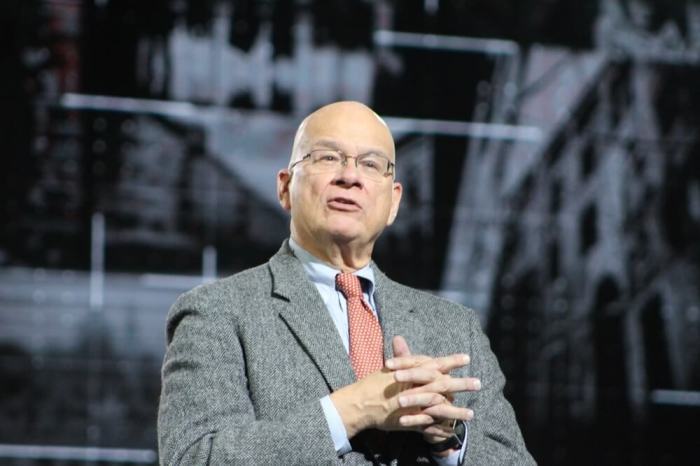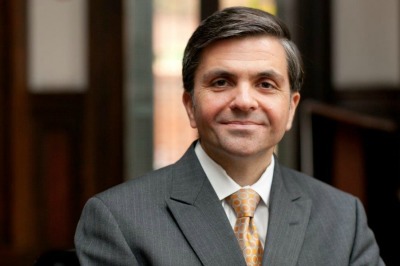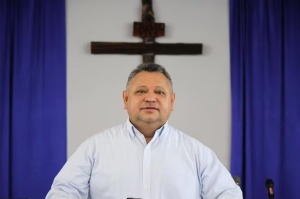Opposing Tim Keller at Princeton Seminary

There is some opposition to New York pastor Tim Keller speaking at Princeton Seminary on April 6 because his denomination doesn't ordain women or LGBTQ people. He belongs to the Presbyterian Church in America, a growing conservative denomination that dates to the 1970s. Keller is receiving The Abraham Kuyper Prize for Excellence in Reformed Theology and Public Life, which honors contributors to the "Neo-Calvinist vision of religious engagement."
Keller, a prolific author and popular speaker, is founder of Redeemer Presbyterian Church in Manhattan, which has in turn planted many other new churches in New York. This church network is notable for its success in attracting young urban professionals and for its racial diversity. The popularity of these churches rebuts some stereotypes about secular New York City and about young adults. The model of these churches and Keller's writing have inspired countless other new church plants especially successful with young people in cities across America.

Unfailingly thoughtful and cerebral, frequently appearing in secular media as a religious and cultural commentator, Keller is one of the most influential pastors and Christian thinkers in America today. He is a guru of the rebirth of urban evangelical Protestant Christianity. His theology like his denomination's is orthodox and Reformed. Keller typically avoids culture war issues and hot button debates. He affirms traditional Christian sexual ethics and marriage teaching but rarely speaks about it. His churches are full of New Yorkers who are socially liberal but drawn to his intellectually vibrant presentation of Christianity.
One Princeton graduate, a minister in the liberal Presbyterian Church (USA), has been quoted in The Christian Post denouncing Keller's scheduled appearance at her alma mater in her blog, which declares:
"... An institution designed to train men and women for ministry shouldn't be awarding fancy prizes to someone who believes half the student body (or is it more than half?) has no business leading churches. It's offensive and, as I have taught my four and five year olds to express, it hurts my feelings."
She also complains that "he (and the denomination he serves) is also very clear in its exclusion of LGBT people."
Similarly, a Christian Century column derides Keller as:
"... one of the loudest, most read, and most adhered-to proponents of male headship in the home. I am literally shaking with grief as I write this. I have spent years with women who have tried to de-program themselves after growing up in this baptized abuse."
This columnist associates Keller with sexual "complimentarianism," which "means married women have no choice over their lives at all." Parishioners at Keller's Manhattan churches likely would be surprised by this assertion.
She concludes:
"I hoped that my denomination would stand up for women, loud and clear. Instead we are honoring and celebrating a man who has championed toxic theology for decades."
Princeton Seminary President Craig Barnes, who formerly pastored a relatively conservative PCUSA congregation in Washington DC that doesn't agree with its denomination on same sex marriage, has responded to criticism by explaining:
"Our seminary embraces full inclusion for ordained leadership of the church. We clearly stand in prophetic opposition to the PCA and many other Christian denominations that do not extend the full exercise of Spirit filled gifts for women or those of various sexual orientations."
Barnes further explained:
"It is also a core conviction of our seminary to be a serious academic institution that will sometimes bring controversial speakers to campus because we refuse to exclude voices within the church. Diversity of theological thought and practice has long been a hallmark of our school. And so we have had a wide variety of featured speakers on campus including others who come from traditions that do not ordain women or LGBTQ+ individuals, such as many wings of the Protestant church, and bishops of the Orthodox and Roman Catholic communions. So my hope is that we will receive Rev. Keller in a spirit of grace and academic freedom, realizing we can listen to someone with whom many, including me, strongly disagree about this critical issue of justice."
So good for Barnes that he defends academic freedom. But how sad that he apparently no longer affirms traditional Christian teaching on marriage. He references "many wings" of Protestantism that don't share the PCUSA's liberalism, plus Catholics and Orthodox.
This latter point merits elaboration. Nearly all of global Christianity disagrees with the PCUSA and Princeton Seminary on these issues and would align with Keller, who is not exotic or unusual in his stances. Half the world's Christians are Roman Catholic. Another ten percent or more are Orthodox. Most of the rest are conservative evangelical or Pentecostal.
The PCUSA's liberal perspective is largely confined to a handful of declining denominations in North America, northwest Europe, Australia and New Zealand, collectively including not more than two or three percent of global Christianity. Much of global Protestant Christianity, including Methodism and parts of Anglicanism, plus Pentecostalism, ordains women. But almost none dissents from orthodox teaching on marriage and sexual ethics.
The objectors to Keller speaking at Princeton would also, if consistent, have to object to the Pope and to the clerics of nearly every major Christian body. They of course would also have to exclude, by the same standards, Muslims, Hindus, Buddhists, Shintoists, and almost every major religion.
Although its celebrants often don't realize it, the universe of liberal Protestantism is very small and getting smaller. Keller will speak at Princeton on church planting, and hopefully he will be heard.
Originally posted at juicyecumenium.com.





























